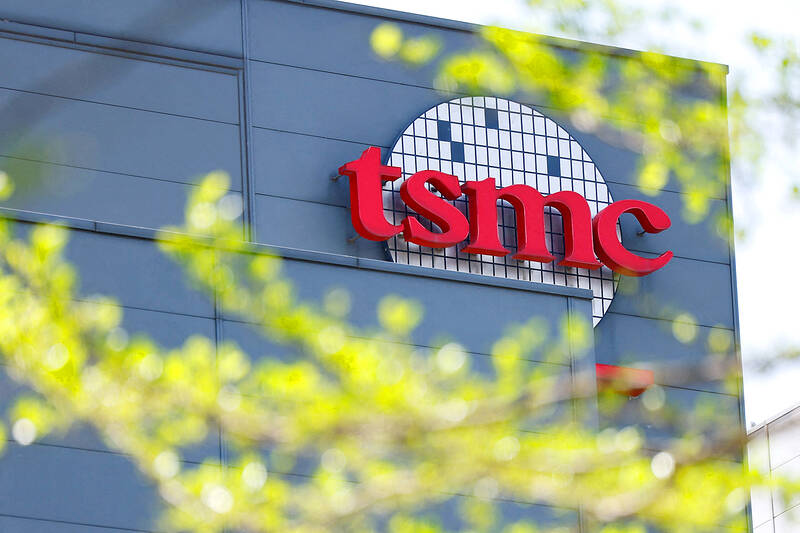Taiwan Semiconductor Manufacturing Co (TSMC, 台積電), the world’s largest contract chipmaker, said yesterday that TSMC Global Ltd, its financial investment arm, has decided to increase its capital, in an effort to cut foreign exchange hedging costs as the New Taiwan dollar appreciates against the US dollar.
TSMC said a board meeting of TSMC Global, registered in the British Virgin Islands to manage the chipmaker’s financial investments, approved a plan earlier in the day to make a rights issue to increase its capital by US$10 billion and lower foreign exchange hedging costs.
The meeting was held after TSMC’s board of directors agreed in February to inject up to US$10 billion into TSMC Global.

Photo: Ann Wang, Reuters
Taiwanese exporters have come under pressure as the NT dollar rapidly appreciated against the greenback recently. A stronger local currency is expected to lead to foreign exchange losses, which will erode the profitability of Taiwanese exporters.
So far this year, the NT dollar has risen against the US dollar by more than 11.5 percent.
Last month alone, the local currency soared NT$2.088, or nearly 7 percent, against the US dollar amid market speculation that the US had pressured Taiwan to allow currency appreciation as part of ongoing trade and tariff negotiations between the two sides. However, the central bank denied it came under pressure from Washington.
This month, the appreciation of the NT dollar has continued, initially amid escalating tensions in the Middle East.
Yesterday, the local currency appreciated 0.49 percent to close at NT$29.391 against the greenback, its strongest in more than three years, as the US Federal Reserve signaled a dovish tone on monetary policy, despite hopes that a ceasefire between Israel and Iran will hold.
TSMC chairman C.C. Wei (魏哲家) said at an annual general meeting earlier this month that every 1 percent appreciation in the local currency reduces the company’s operating margin by 0.4 percentage points.
The impact resulting from a higher NT dollar has been large, Wei admitted, but added that TSMC will work to maintain its lead over its peers in technology development and sell products at reasonable prices.

NEW IDENTITY: Known for its software, India has expanded into hardware, with its semiconductor industry growing from US$38bn in 2023 to US$45bn to US$50bn India on Saturday inaugurated its first semiconductor assembly and test facility, a milestone in the government’s push to reduce dependence on foreign chipmakers and stake a claim in a sector dominated by China. Indian Prime Minister Narendra Modi opened US firm Micron Technology Inc’s semiconductor assembly, test and packaging unit in his home state of Gujarat, hailing the “dawn of a new era” for India’s technology ambitions. “When young Indians look back in the future, they will see this decade as the turning point in our tech future,” Modi told the event, which was broadcast on his YouTube channel. The plant would convert

‘SEISMIC SHIFT’: The researcher forecast there would be about 1.1 billion mobile shipments this year, down from 1.26 billion the prior year and erasing years of gains The global smartphone market is expected to contract 12.9 percent this year due to the unprecedented memorychip shortage, marking “a crisis like no other,” researcher International Data Corp (IDC) said. The new forecast, a dramatic revision down from earlier estimates, gives the latest accounting of the ongoing memory crunch that is affecting every corner of the electronics industry. The demand for advanced memory to power artificial intelligence (AI) tasks has drained global supply until well into next year and jeopardizes the business model of many smartphone makers. IDC forecast about 1.1 billion mobile shipments this year, down from 1.26 billion the prior

People stand in a Pokemon store in Tokyo on Thursday. One of the world highest-grossing franchises is celebrated its 30th anniversary yesterday.

Zimbabwe’s ban on raw lithium exports is forcing Chinese miners to rethink their strategy, speeding up plans to process the metal locally instead of shipping it to China’s vast rechargeable battery industry. The country is Africa’s largest lithium producer and has one of the world’s largest reserves, according to the US Geological Survey (USGS). Zimbabwe already banned the export of lithium ore in 2022 and last year announced it would halt exports of lithium concentrates from January next year. However, on Wednesday it imposed the ban with immediate effect, leaving unclear what the lithium mining sector would do in the